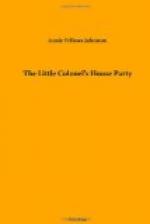Eugenia was so astonished! She did not know that Joyce can speak French. She has a way of using it herself all the time when she talks. She is always throwing in a French word or sentence that Lloyd and I can’t understand. Joyce laughed about it to me the first day she came, and said Eugenia is just as apt to use the wrong word as the right one. This was the first time that Joyce had spoken French, and Eugenia was so surprised she couldn’t help showing it, and asked her why she had never said anything before in that language. Joyce told her that her teacher never allowed her to mix the languages. She said it was in bad taste to do so in speaking to people who only understood one; that it seemed affected, or as if the person wanted to show off how much she knew.
Then that made Eugenia mad, and she asked her in a spiteful way if it was a public school teacher that told her that, and said she didn’t know that they taught French out West. Joyce said yes, that they did, but that of course a year abroad was quite a help, and that before she left France they told her that her accent was quite Parisian.
That took the wind out of Eugenia’s sails. She did not know that Joyce had been abroad. She is crazy to go herself, but that is the one thing that her father will not humour her in. He says that she must wait until she is older, and he has time to go with her himself. All her friends have been, and it seemed to mortify her that Joyce was ahead of her there. She hasn’t put on any airs with Joyce since, although she still does with me.
This is a great deal of nonsense to write in my “Good times” book, but I have put it in to explain why we have paired off as we have. Joyce and I go together now, and Eugenia and Lloyd. Eugenia flatters her all the time, and never says hateful things to her as she does to us, and Lloyd thinks that Eugenia is perfection.
Some letters came this afternoon,—a whole handful for Eugenia, written on handsome linen paper and sealed with pretty monogram seals. I had a letter, too. The first one since I have been here. It was from Davy, and printed in big tipsy letters that straggled all over the page. There were only a few lines, but I knew how long the little fellow must have worked over them, gripping the pencil tight in his hard little fist. I was so proud of it, Davy’s first letter, that I passed it around for the girls to see. Lloyd and Joyce were interested and amused, and laughed as I had done over the dear crooked letters; but Eugenia was in one of her high and mighty moods, and she only lifted those black eyebrows in that indifferent way of hers, and tossed it back.
“What awfully queer letter-paper,” she said. “Ruled! I didn’t know that anybody ever wrote on ruled paper nowadays, but servants. Eliot always does, but it’s so common to use it, you know.”
I could hardly keep the tears back to have her make fun of poor little Davy’s letter. For a few minutes I was so homesick that I wished I was back with Davy in the plain old farmhouse, where it doesn’t make any difference whether there are lines on your paper or not, or any such silly things as that. Everybody uses ruled paper there, for that matter, because Squire Jaynes doesn’t sell any other kind. What difference does it make, anyhow, I should like to know?




